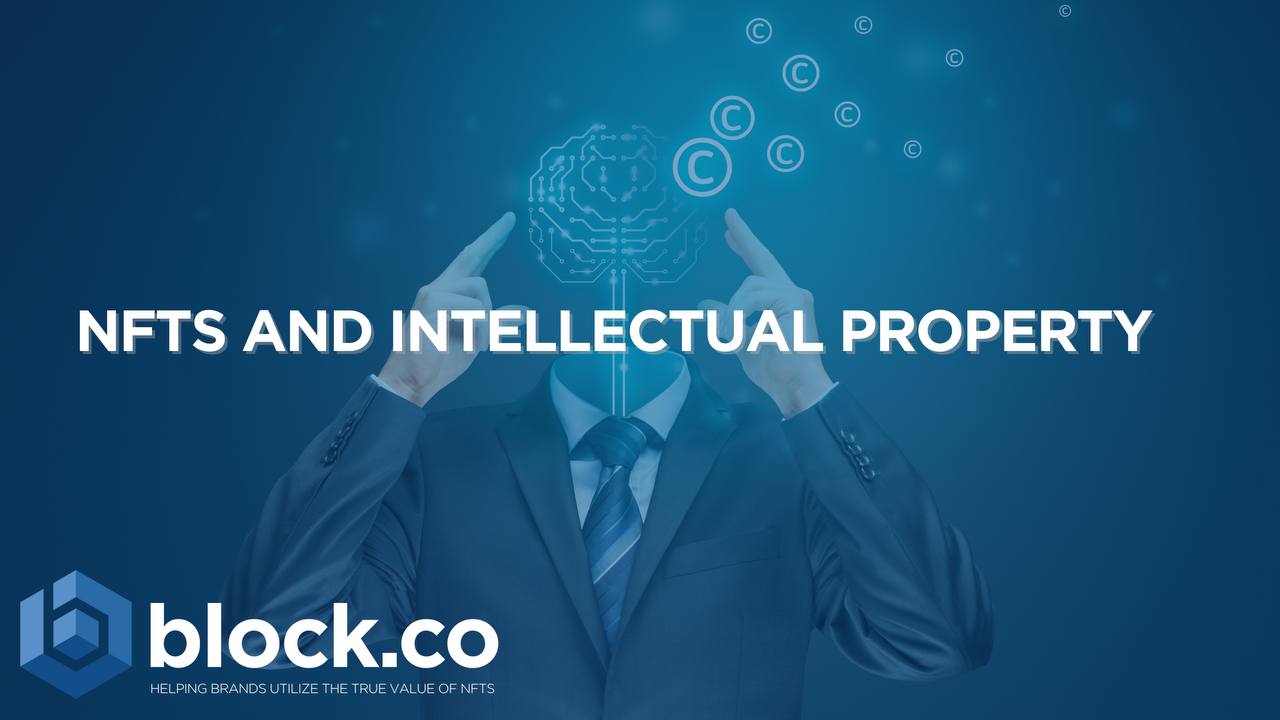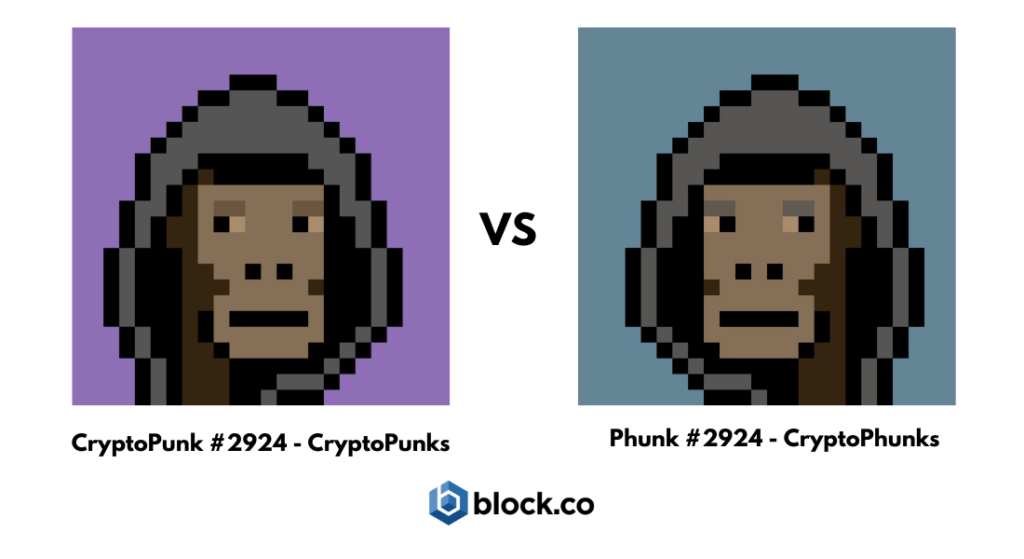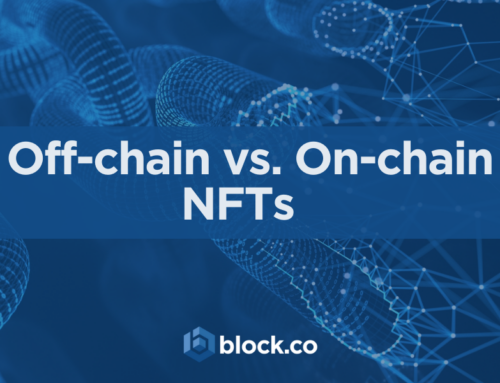NFTs and Intellectual Property

Written by George Agathangelou
With all the opportunities that NFTs present for brands and businesses, they also create room for misuse of a brand’s intellectual property rights held in underlying assets through the minting of unauthorized NFTs. The growing popularity of new technologies like NFTs, as brands expand their presence in the metaverse, can raise various legal questions, as well as allow criminal activity. In this article, we will explore how existing trademark and copyright laws can be used to protect brands, NFTs, and NFT-related products in real life and the metaverse, and how block.co platform accommodates for this.
When referring to Intellectual property (IP), we mean a category of property that includes intangible creations of the human intellect with copyrights, patents, trademarks, and trade secrets being among the best-known types. NFTs are increasingly interesting when it comes to intellectual property law. Even though NFT technology is generally new, the intellectual property laws governing it are not. Intellectual Property law usually protects intangible assets, such as inventions related to patent laws, songs and artworks related to copyright law, or even logos related to trademark law. However, IP owners who could benefit from this NFT boom could include brands with well-known trademarks, logos and other marks, game companies with unique game characters or art, books, movies, and publishers with IPs, creative artists with physical or digital works and other IP owners.
What is an NFT?
NFTs are units of blockchain-based “tokens” with a unique ID associated with the underlying asset. The most used blockchain for NFTs is the Ethereum blockchain, but NFTs are also maintained on other blockchains.
NFTs are composed of software code in the form of a so-called “smart contract“. The smart contract holds details of the underlying asset to which the NFT relates, as well as the rules and rights that accompany the NFT (for example, it may be a software encoded rule that the original creator of the NFT will receive royalties as a percentage of any subsequent sale).
The NFT value is derived from its non-fungibility. This means that the token cannot be replaced by an identical token, as it is entirely unique and scarce. This contrasts with the substitutable or fungible nature of a cryptocurrency or fiat currency like the euro or the US dollar, where each unit of currency has the same value and is interchangeable with another unit of currency.
Let’s use a real-life example of an oil painting to help you understand NFTs. In the real world, an oil painting prepared by an artist would include the signature of the artist and perhaps a printed serial number for the artwork (e.g., 1 of 3 artworks). In this case, the signature of the artist and the serial number of the artwork are not the artwork itself, but a method of proving that the artwork is genuine. In the digital realm of NFTs, the NFT would stand for the digital form of the signature and the serial number of the artwork, that is associated with the underlying asset and would link the underlying asset with the digital work. The IP rights would remain with the creator of that IP just like if you had bought an oil painting. When you buy an oil painting, you are entitled only to that painting, and not the right to sell copies of it or charge another person a license fee to view or display it. So, the TLDR here is that when you buy NFTs, you do NOT buy the IP rights associated with the item underlying the NFT. However, in most cases, you get a non-exclusive and non-transferable license to use, copy and display the creative work associated with the NFT for PERSONAL use.
Copyright Infringement
A copyright is a type of intellectual property that gives its owner the exclusive right to copy, distribute, adapt, display, and perform creative work, usually for a limited time. The creative work may be in a literary, artistic, educational, or musical form. The purpose of copyright is to safeguard the artist’s original expression of an idea in a creative work, not the concept itself.
Copyright protects original works of authorship giving the owner the right to copy and distribute the fixed work for a period. Types of works that can be protected by copyright include paintings, photographs, illustrations, musical compositions, sound recordings, computer programs, books, poems, blog posts, movies, etc. To receive registered copyright protection, a work must be “original,” meaning that the author created it independently. For copyright registration, the work must also exhibit at least a certain level of creativity.
There are two main types of copyright infringement that may arise as a result of the unauthorized minting of an NFT relating to a digital asset:
- Infringement of the reproduction right (i.e., the restriction against reproducing or copying copyright works). If the NFT includes a digital copy of the asset, there is potential for this to create an unauthorized reproduction that may result in infringement of copyright.
- Infringement of the communication right (i.e., the restriction against communicating copyright works to a new public or channel not originally planned by the copyright owner). The minting of an NFT linked to an underlying asset is different from making the asset available in a new forum. However, if the NFT does include a digital copy of the asset, minting the asset as an NFT may well amount to a communication to a new public that was not planned by the copyright holder. If you are minting an NFT for a digital asset that includes content or trademarks that you do not own or have a valid license to use, then you could be liable for infringing third-party intellectual property. Moreover, this means that if you do not have the necessary rights to the intellectual property that is used in your NFT, you do not have the right to grant these rights to the purchaser of your NFT either. If you misstate the rights that are being conveyed in connection with the sale of your NFT, you may be subject to added claims. Even unintentionally, exchanges or platforms that sell or display digital assets that incorporate third-party copyrights or trademarks may be subject to IP lawsuits.
Trademark Infringement
A trademark is a type of intellectual property consisting of a recognizable sign, design, or expression that finds products or services from a particular source and distinguishes them from others. The trademark owner can be an individual, business organization, or any legal entity. A trademark may be found on a package, a label, a voucher, or on the product itself.
Trademark infringement may arise where an unauthorized party mints an NFT linked to the underlying asset, without the asset owner’s permission, and advertises, offers for sale and/or sells the NFT using the asset owner’s registered trademarks. The key question to consider here is whether the business owns registered trademarks that cover NFTs or similar goods/services. If it does, then there may be a relatively straightforward case for trademark infringement under trademark law. For example, the same trademark is being used as the asset owner’s registered trademark for identical goods or services, or the same or similar trademark is being used as the asset owner’s registered trademark in relation to the same or similar goods, giving rise to a likelihood of confusion.
However, even if the asset owner does not hold any trademarks for relevant goods/services, this does not signal the end: it may be possible, in certain circumstances, to argue that use of the same or similar mark for dissimilar goods takes unfair advantage of the reputation of the brand’s registered trademark and therefore amounts to infringement again. This also means that there should also be appropriate oversight of the use of a brand’s IP by third parties (be that buyer of an NFT or third parties) and steps should be taken where appropriate.

For example, according to the Bored Ape Gazette, Yuga Labs (creators of Bored Ape NFTs) have sued artist Ryder Ripps and his associates for “scamming consumers” with fake ‘copycat’ NFTs in a “deliberate effort to harm Yuga Labs at the expense of consumers.” The lawsuit accuses them of producing and selling “copycat NFT” that devalues the originals. Since then, Ripps’s collection has been taken down from OpenSea, the biggest NFT market, due to “a claim of intellectual property violation,” but not before it saw nearly $3.5 million in total volume transacted.
A more common tactic is for an NFT seller and owner of the IP rights to grant the buyer of the NFT a license allowing them to utilize the IP rights in the underlying asset for specific purposes. Such a license should be set out in the smart contract or in a separate agreement between the NFT seller and purchaser. The purchaser’s use of the underlying asset can be as open or restrictive as the rights owner chooses. We believe that clear description of what is permitted and what is not with respect to IP rights should be set out in the terms of sale of the NFT and/or the smart contract encoded, which will best allow a business to control its IP as well as to monetize it. To tackle this, we have included a separate segment for brands to incorporate specific Terms & Conditions that will apply to the collection of NFTs minted. The recipients of each NFT will have to accept the Terms and Conditions, in order to be able to claim the NFT. In case of any disputes regarding the Intellectual Property of the NFTs, then courts may refer to the Terms and Conditions stipulated for the collection and decide accordingly.
How to monitor and enforce IP rights
There are certain steps that a business can take to monitor and enforce its intellectual property rights. These may include monitoring NFT marketplaces and acting where appropriate. For example, there may be minters who do not have authorization to mint an NFT linked to the business’s underlying asset. In this case, the brand may issue take-down notices and request details of unauthorized minters for legal persecution. Moreover, the buyers of NFTs may not be acting in accordance with the smart contract (or any other contract) and may be infringing the brand’s rights, which then may give rise to claims for breach of contract and/or IP rights infringement. An additional requirement is the adequate training of staff on the unlicensed use of IP in an NFT. Alternatively, brands may consider outsourcing the function to web3 experts like block.co.
Brands are already establishing a presence in the metaverse by offering their products and goods, setting up virtual showrooms, and taking other actions to expand their footprint and establish the use of their brands. As they advance their way in the metaverse, they will also need to pay attention to unlawful uses of their copyrights, trade dress, and trademarks in the digital realm. An infringing NFT should ideally be subject to enforcement measures as soon as it is advertised for sale on an exchange, preferably before it is sold. This is in addition to obtaining registrations for trademarks and copyrights, which will provide the necessary tools to stop others from misusing priceless brand assets. Doing so may help avoid widespread unauthorized use of intellectual property rights by third parties and make their enforcement easier.
With the proper support, the vast majority of NFTs created by reputable companies can easily comply with the relevant laws and steer clear of these and other legal issues. It is important to work with a reputable partner like block.co who understands the legal issues that can arise with NFTs and who can identify and inform you of the relevant legal issues based on the specific facts of your NFT. At block.co we ensure that content creators are verified and that they are the copyright owners of the NFT designs before allowing the use of our platform for minting.
If your brand is ready to take the step into web 3.0 and NFT marketing, to optimize engagement with your audience in innovative ways, then click the button below to get your Free Trial, a limited number of Free NFTs, and a Free Consultation call from our team!
To get more information about Block.co’s services, please contact Block.co directly or email at enquiries@block.co.
Tel +357 70007828
We regularly post educational materials on our social media, follow us to stay up to date about the latest blockchain and NFT news.







